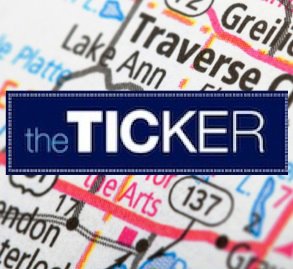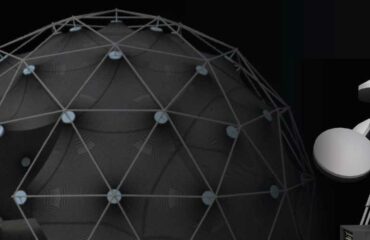Traverse City Ticker
January 8, 2023
By Craig Manning
Could a game-changing treatment for COVID-19 soon be one of northern Michigan’s most valuable exports? Northern Michigan’s newest innovator, Bruce Patterson, M.D., thinks so.
Patterson (pictured, right), formerly the director of clinical virology and co-director of the AIDS Research Center at Stanford University, is the CEO and founder of IncellDx, Inc., described as “a molecular diagnostics company dedicated to revolutionizing healthcare one cell at a time.” He’s also a brand-new northern Michigan resident, having relocated from his former home in Silicon Valley. IncellDx, which purports to be at the cutting edge of multiple types of disease diagnostics and therapeutics – including COVID-19 – is making the move with him.
As Patterson tells it, it was only a matter of time before he and his company ended up back in the Mitten. “My family has had a presence [in northern Michigan] for five generations, in terms of being here in the summer,” he says. He also got his undergraduate training at the University of Michigan, before matriculating to Northwestern University for medical school. Since 2007, he and his wife have maintained a summer home in Frankfort. With their daughter in college – and with the pandemic triggering a remote work revolution – Patterson and his wife decided to relocate.
Also involved in that decision was Casey Cowell’s Boomerang Catapult, which works actively to bring businesses to the region – including, increasingly, those that travel in the biotechnology and healthcare circles to which IncellDx belongs. Impressed by Boomerang Catapult’s ability to bring “people from all walks of life” to northern Michigan – and by Traverse City’s growing status as a hub of innovation and entrepreneurship – Patterson decided to bring his business with him.
“Really, we’d split our business into two parts anyway – diagnostics and therapeutics,” Patterson says. “And it just made sense for the therapeutic side of our business to be based someplace like Traverse City – a place that’s trying to promote life science and biotechnology, and to do it in such a beautiful place. It’s a spot where we can do great science in an inspiring setting.”
What exactly is the science of IncellDx? That part of the tale starts decades ago, when, in the early days of the AIDS epidemic, he “began investigating cellular reservoirs of HIV-1 using molecular and in situ technology patented in his laboratory.” Patterson eventually “determined that enough HIV virus was present in infected individuals to account for the massive destruction of the immune system.” That research, published in the scientific journal Science in 1993, played a crucial role in the scientific community’s understanding of how HIV and AIDS affected the immune system, and how they could be detected and diagnosed at the cellular level.
That passion for molecular diagnostics eventually led to the establishment of IncellDx, which Patterson founded in 2009. The company’s approach involves “combining proprietary molecular diagnostics with cellular analysis,” which can provide “specific molecular details about each and every cell.” The idea is that “every cell tells a story,” and that looking at every cell can offer “diagnostic, prognostic, and therapeutic clinical information for physicians to make more informed clinical decisions.”
IncellDx focuses this technology on addressing “critical life-threatening diseases,” including HIV/AIDS, cancer, hepatitis, organ transplant infections, and now, COVID-19. IncellDx says it has developed a diagnostic test that can not only detect long-haul COVID, but also inform a treatment plan and show patients the plan is having an impact.
“We were the first to identify long COVID,” Patterson says. “We were the first to identify what the effects are on the immune system from long COVID. We were the first to identify what might be causing long COVID. And then we came up with a therapeutic for long COVID that looks very promising.”
Patterson says IncellDx’s diagnostics for long COVID have already “been commercialized all over,” including in the U.S., Australia, the United Kingdom, and throughout the European Union. “So, we’re already testing a lot of patients who think they have the symptoms of long COVID, and we’re using those test results and algorithms to decide what drugs they might respond to…The next plan is to take those drugs through the FDA and get them approved.”
The drugs are already approved in a sense; they have previously been used to treat conditions like HIV and high blood pressure. Patterson believes the process to get those drugs approved for treating long COVID should be “relatively short.”
“We’ve done some preliminary trials and published those, and we’re really excited to get going on our FDA trial,” Patterson says. “And it’s going to be a smooth pathway, because the drugs are already approved; we just repurposed them, which means we don’t have to go through phase one, phase two, phase three [of testing]…So, fingers crossed, we could see an approval by the end of 2023.”
Patterson views an effective treatment for long COVID as an essential tool for allowing the world to move on from the pandemic. “There’s an economic analysis saying that [long COVID] could be a trillion-dollar-a-year problem for the U.S. healthcare system,” he says. “It’s estimated that 140 million people worldwide may have it, including 20-30 million Americans…That’s really the new epidemic, to me, because it doesn’t matter how mild the infection is…So, long COVID is a big problem and it’s going to be for a while.”
Boomerang Catapult, which will take the lead in funding the FDA trial for IncellDx, also sees significant value in what IncellDx is trying to accomplish. “To have Traverse City as the center of long COVID therapy in the U.S. would be extremely meaningful,” says Lowell Gruman, Boomerang’s managing partner. Gruman also notes that IncellDx is part of a growing “cluster” of innovative life science businesses that Boomerang is building in northern Michigan – a trend he hopes will establish the region as “a center for life science startups and emerging growth” within the next few years.
In addition to IncellDx, Boomerang Catapult successfully courted a Wisconsin-based company called Atterx to relocate its operations to Traverse City. That business, which Ticker sister publication the Traverse City Business News profiled in November, is working to address the world’s growing problem with drug-resistant infections.
“Once you get three or four [businesses in a cluster like this], it starts to become a self-fulfilling prophecy,” Cowell says. “Success begets success. The fact that a few companies are here attracts more companies, and you get a community of interest around this sort of concentration that just reinforces itself.”
Pictured: Lowell Gruman (left) and Bruce Patterson (right)





